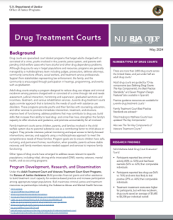Court records
Priority Prosecution of the Serious Habitual Juvenile Offender: Roadblocks to Early Warning, Early Intervention, and Maximum Effectiveness -- The Philadelphia Study
National Assessment of Criminal Court Use of Defendants' Juvenile Adjudication Records
Criminal Careers and Crime Control: A Matched-Sample Longitudinal Research Design, Phase I - A User's Guide to the Machine-Readable Files and Documentation and Codebook
Prosecuting Complex Drug Cases: The Challenge for Local Prosecutors
Analyzing Court Delay-Reduction Programs - Why Do Some Succeed?
Comparison of Drug Control Strategies in San Diego, June- November, 1989: A User's Guide to the Machine-Readable Files and Documentation, Codebook, and Original Instruments
Evaluation of Gang Interventions: Final Report
Early Intervention System Secures Data, Boosts Efficiency
Priority Prosecution of the Serious Habitual Juvenile Offender: Roadblocks to Early Warning, Early Intervention, and Maximum Effectiveness -- The Philadelphia Study, Executive Summary of Findings, Final Report
Comparison of Victims' Reports and Court Records of Intimate Partner Violence Perpetrators' Criminal Case Outcomes
Specialized Domestic Violence Court in South Carolina: An Example of Procedural Justice for Victims and Defendants
Systematic Analysis of Product Counterfeiting Schemes, Offenders, and Victims in the United States
Using Physician Behavioral Big Data for High Precision Fraud Prediction and Detections
Exploring the Causal Role of Child Welfare System Experiences on Juvenile Justice Involvement
Custody Evaluation in Domestic Violence Cases
Panelists will examine practices, beliefs and recommendations of professional and custody evaluators in domestic violence cases. Panelists will discuss current NIJ studies that use both qualitative and quantitative methods to assess the impact of personal attitudes and beliefs on custody evaluation.
What Works in Offender Supervision - Panel at the 2009 NIJ Conference
This NIJ Conference Panel highlights findings from NIJ projects that evaluated strategies to enhance the supervision of offenders in the community. Researchers discuss the effectiveness of fair, swift and certain sanctions for high-risk probationers in the Hawaii HOPE program. Panelists also provide empirical evidence on the effectiveness of electronic monitoring — including the use of GPS tracking — for medium- and high-risk offenders on supervision and upon completion of their supervision sentence.
Scaling-Up Evidence-Based Programs Using a Public Funding Stream - a Randomized Trial of Functional Family Therapy for Court-Involved Youth
Improving the Accuracy and Fairness of Pretrial Release Decisions: A Multi-Site Study of Risk Assessments Implemented in Four Counties
Reducing Gang Violence: A Long-Term Follow-Up of a Randomized Trial of Functional Family Therapy
Investigative and Prosecutorial Strategies for Mitigating Pathways to Radicalization: Creation of a Federal Terrorism Court Record Repository
Drug Treatment Courts
Stop Snitching or Keep Talking? Civilian Information Provision to the Baltimore Police
Police Officer Crimes and Police Integrity
However, in some cases, at times due to the stressors of the job and frequent exposure to trauma and violence, officers engage in misconduct or criminal behavior. The National Institute of Justice understands what’s at stake for public safety and officer wellness when we ignore warning signs of officers struggling with occupational hazards and other psychological hardships.
See the YouTube Terms of Service and Google Privacy Policy


